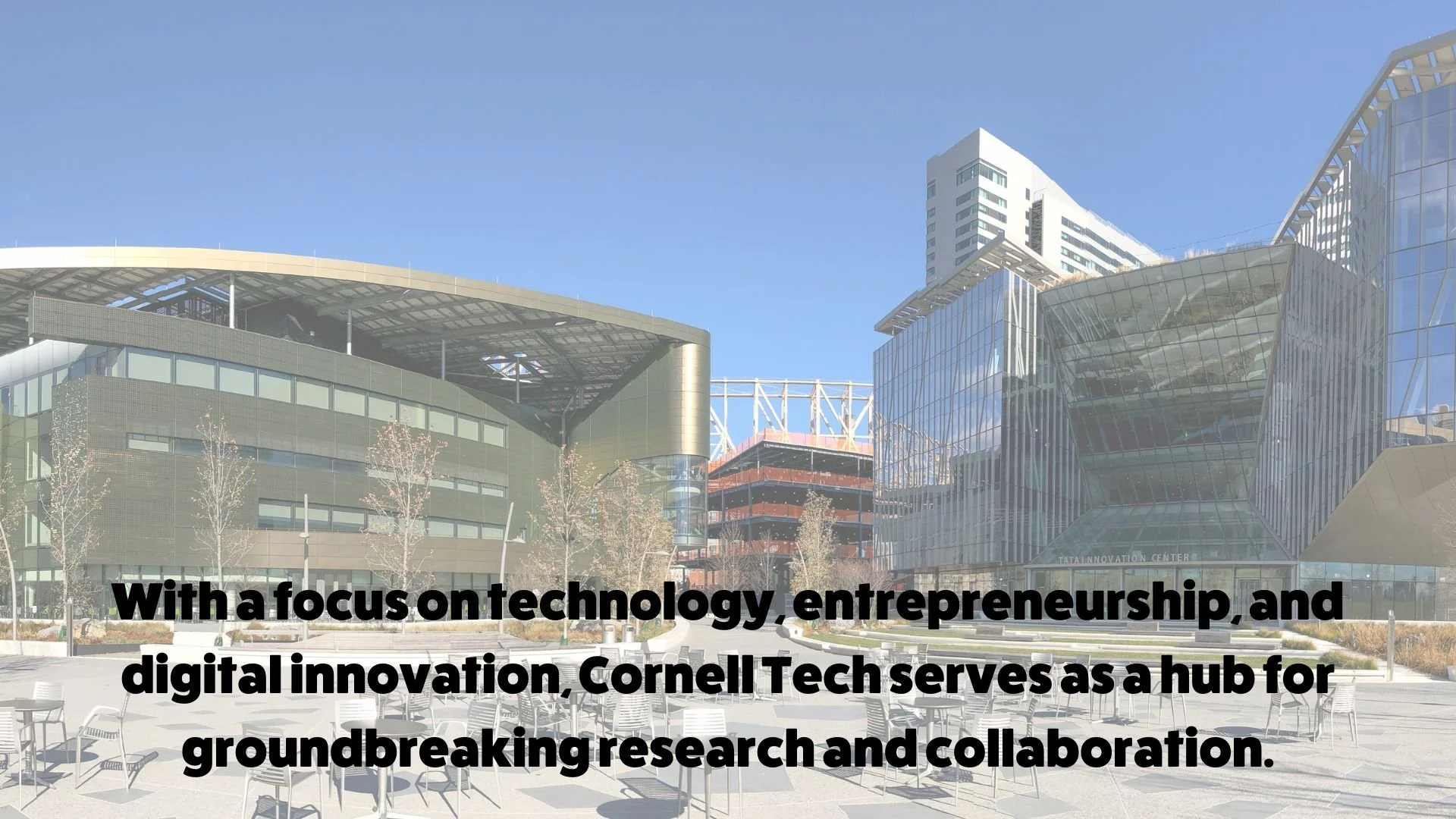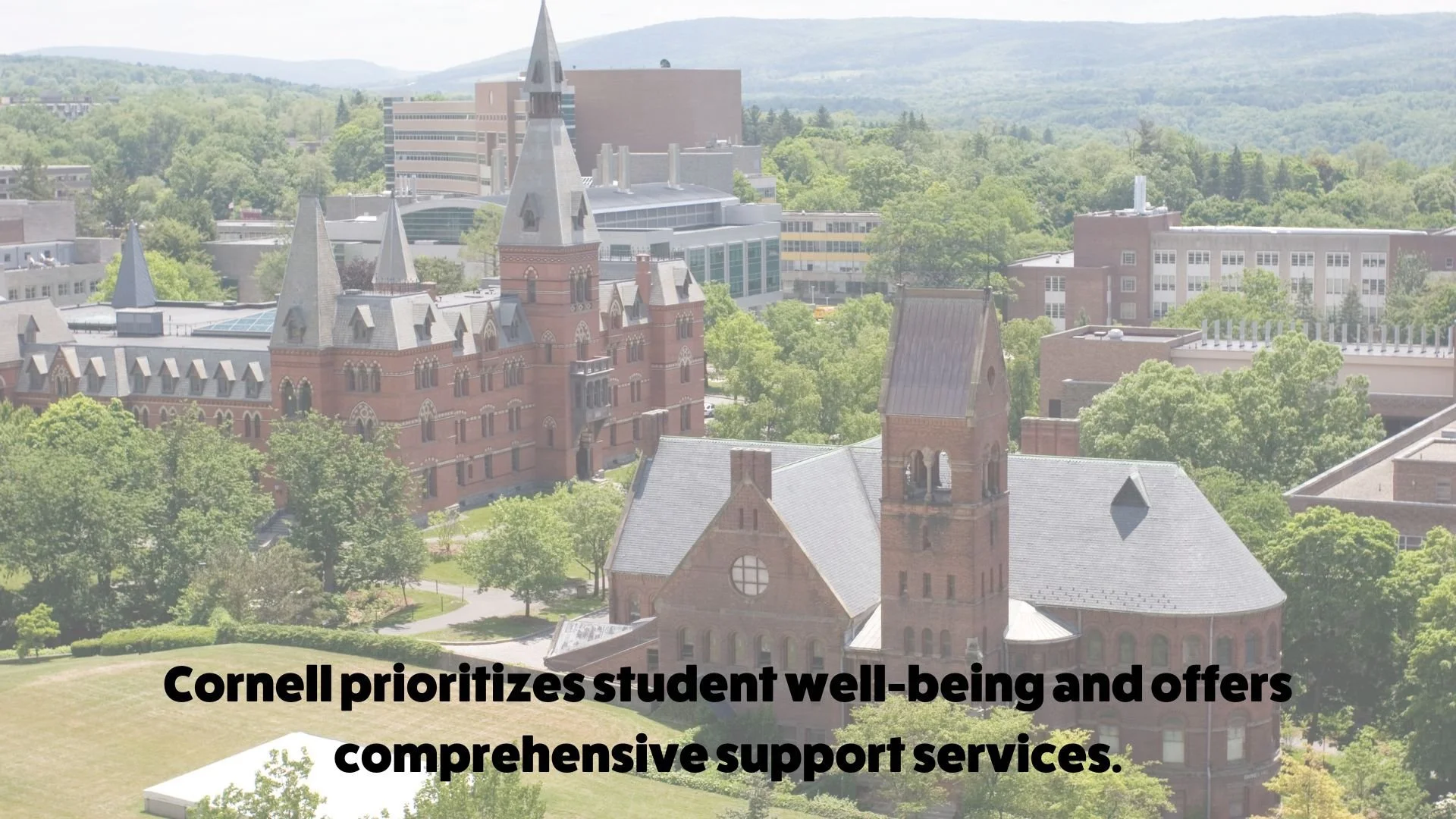What is Cornell Known For? Distinguishing Factors of Big Red
When it comes to renowned educational institutions in the United States, few names resonate as strongly as Cornell University. Located in the picturesque region of Ithaca, New York, Cornell has emerged as a prominent Ivy League institution with a distinguished history spanning over 150 years. The university's reputation is built on a foundation of academic excellence, breathtaking campus beauty, and a diverse student body. Within this blog post, we will explore the factors that have propelled Cornell to its esteemed status, shedding light on what the university is truly known for.
Cornell University offers a distinctive educational experience, characterized by its commitment to providing a comprehensive range of disciplines across various fields of study. Boasting seven undergraduate colleges, including the prestigious College of Arts and Sciences, College of Engineering, and College of Agriculture and Life Sciences, Cornell empowers students to pursue their passions and tailor their education to their individual interests. This commitment to academic breadth is a defining feature of Cornell and contributes to its reputation as a leading institution for intellectual exploration and growth.
Interested in showcasing your intellectual vitality and initiative during high school? Find out how YOU can apply artificial intelligence to the subjects that interest you in InspiritAI’s AI Scholars Program. Students in the Inspirit AI Scholars program craft interdisciplinary AI projects engaging subjects of personal interest to them. Additionally, many students who have participated in the AI+X Individual Research Mentorship have gone on to win prestigious awards at various science fair competitions!
What is Cornell known for?
A LEGACY OF ACADEMIC EXCELLENCE
Cornell University has long been synonymous with academic excellence, earning its place as one of the world's most prestigious educational institutions. What sets Cornell apart is its unwavering commitment to providing a comprehensive and rigorous academic experience across a wide range of disciplines.
The university's seven undergraduate colleges form the foundation of its academic offerings. The College of Arts and Sciences, one of the largest and most diverse units at Cornell, provides students with a broad liberal arts education. From literature and history to mathematics and neuroscience, the College of Arts and Sciences offers an expansive curriculum that encourages interdisciplinary exploration and cultivates well-rounded graduates equipped with critical thinking skills.
Cornell's College of Engineering stands out as a hub of innovation and technological advancement. Renowned for its cutting-edge research and esteemed faculty, the college offers programs in areas such as computer science, mechanical engineering, and biomedical engineering. Students benefit from state-of-the-art facilities and hands-on learning opportunities, preparing them for impactful careers in engineering and technology.
Another prominent college at Cornell is the College of Agriculture and Life Sciences (CALS), which has a rich history of pioneering research and advancements in the field. CALS offers a wide range of majors, from animal science and plant sciences to environmental and sustainability sciences. Students at CALS benefit from engaging in experiential learning, fieldwork, and collaborations with leading industry experts, enabling them to address critical challenges in food systems, environmental sustainability, and human health.
Cornell University's professional schools further contribute to its academic prowess. The College of Veterinary Medicine, for instance, is renowned for its innovative research and exceptional training of veterinarians. The Cornell Law School ranks among the top law schools in the United States, attracting aspiring legal minds from around the globe. Additionally, the Cornell Johnson Graduate School of Management is highly regarded for its MBA program and its emphasis on leadership and entrepreneurship.
Furthermore, Cornell University embraces a culture of intellectual curiosity and research. Students at all levels are encouraged to engage in cutting-edge research projects alongside renowned faculty members. From the humanities to the sciences, Cornell fosters an environment where students can contribute to the advancement of knowledge and make meaningful discoveries.
To support their academic endeavors, students have access to world-class libraries, state-of-the-art laboratories, and advanced research facilities. The university's commitment to providing resources for academic success is reflected in its extensive library system, which includes the iconic Olin Library and the Mann Library, housing vast collections and digital resources for comprehensive study and research.
Overall, Cornell University's legacy of academic excellence is deeply rooted in its diverse range of programs, interdisciplinary approach, and dedication to fostering a spirit of intellectual exploration. Through its commitment to providing a robust education across a wide spectrum of fields, Cornell equips students with the knowledge, skills, and intellectual curiosity necessary to tackle complex global challenges and make a lasting impact in their chosen fields of study.
GROUNDBREAKING RESEARCH AND INNOVATION
Cornell University has earned a prominent place in the realm of groundbreaking research and innovation. The university's commitment to pushing the boundaries of knowledge and fostering a culture of innovation attracts renowned researchers, scholars, and forward-thinking students from around the world.
Cornell is home to numerous research centers and institutes that are at the forefront of pioneering discoveries and technological advancements. The Cornell Center for Materials Research, for example, focuses on materials science and engineering, driving innovations in areas such as nanotechnology, energy storage, and biomaterials. The center provides state-of-the-art facilities and collaborates with leading industry partners to translate research findings into practical applications.
The university's dedication to cutting-edge research extends to its focus on interdisciplinary collaboration. Cornell encourages researchers from diverse fields to come together and tackle complex global challenges. The Atkinson Center for Sustainability, for instance, facilitates interdisciplinary research and collaboration on topics related to sustainable development, renewable energy, and environmental conservation. By fostering collaboration among experts in fields like engineering, agriculture, social sciences, and policy, Cornell drives innovative solutions for a sustainable future.
Cornell's commitment to innovation is exemplified by the Cornell Tech campus located in New York City. With a focus on technology, entrepreneurship, and digital innovation, Cornell Tech serves as a hub for groundbreaking research and collaboration. The campus brings together students, faculty, and industry professionals to tackle real-world problems through the application of cutting-edge technologies. Its close proximity to the vibrant tech ecosystem of New York City provides unique opportunities for students to engage with startups, industry leaders, and investors, fostering a culture of innovation and entrepreneurship.
Moreover, Cornell's research prowess extends to areas such as biotechnology, biomedical engineering, and life sciences. The Weill Cornell Medicine, in collaboration with the New York-Presbyterian Hospital, conducts groundbreaking research in healthcare and medical sciences, leading to advancements in patient care and treatment. The university's renowned research initiatives in areas like genomics, cancer biology, and regenerative medicine contribute to advancements in understanding diseases and developing novel therapies.
Cornell's commitment to innovation is not limited to scientific research alone. The university also fosters creativity and artistic expression through programs such as the Cornell Council for the Arts and the Herbert F. Johnson Museum of Art. These initiatives support innovative projects, exhibitions, and performances, nurturing a vibrant arts community on campus and providing a platform for artistic experimentation and expression.
In addition to research centers and programs, Cornell University provides extensive support for entrepreneurial endeavors. The Cornell Center for Technology Licensing (CTL) assists researchers and students in commercializing their inventions and bringing them to market. The university's commitment to entrepreneurship is further reflected in programs like the Cornell Entrepreneurship Network and the eLab, which provide mentorship, resources, and funding opportunities for aspiring entrepreneurs.
Through its emphasis on interdisciplinary collaboration, cutting-edge research facilities, and support for innovation and entrepreneurship, Cornell University continues to drive groundbreaking research and innovation across a wide range of fields. By nurturing an environment that fosters creativity, curiosity, and collaboration, Cornell empowers its students and researchers to address global challenges, develop groundbreaking solutions, and make lasting contributions to society.
A THRIVING STUDENT COMMUNITY
One of the defining features of Cornell University is its vibrant and thriving student community. With students hailing from all 50 U.S. states and over 120 countries, Cornell offers a diverse and inclusive environment that fosters a rich social and cultural tapestry.
The university hosts a myriad of student organizations, clubs, and extracurricular activities, catering to a wide range of interests and passions. From academic and professional clubs to cultural and social organizations, students have ample opportunities to engage with like-minded peers, pursue their interests, and build lifelong connections.
Cornell's vibrant Greek life plays a significant role in fostering a strong sense of community. The university is home to a diverse range of fraternities and sororities, offering students opportunities for leadership development, community service, and lifelong friendships. Greek organizations host a variety of social, philanthropic, and educational events, contributing to the vibrant campus life at Cornell.
In addition to formal organizations, Cornell encourages students to create their own clubs and initiatives through the Student Assembly, allowing them to pursue their unique interests and contribute to the campus community. Whether it's a club focused on entrepreneurship, sustainability, cultural awareness, or the arts, students have the freedom to shape their extracurricular experiences and create a vibrant campus atmosphere.
The university also prioritizes student well-being and offers comprehensive support services. The Office of Student and Campus Life provides resources for personal development, mental health support, career services, and student engagement. Additionally, the vibrant campus features recreational facilities, including fitness centers, sports fields, and hiking trails, promoting a healthy and active lifestyle among students.
Cornell's commitment to a thriving student community extends beyond campus boundaries. The university encourages students to engage in community service and social impact initiatives, fostering a sense of responsibility and citizenship. Through programs like the Public Service Center and Alternative Breaks, students can participate in volunteer work, community development projects, and social justice advocacy, making a positive difference in the local and global communities.
The rich cultural diversity at Cornell is celebrated through various events and festivals that showcase different traditions, cuisines, and performances from around the world. The International Students and Scholars Office (ISSO) supports international students in navigating the unique challenges of studying abroad and promotes cross-cultural understanding and exchange.
The thriving student community at Cornell University creates an environment where students can explore their interests, develop leadership skills, and build lasting connections. The wide array of student organizations, the Greek life, and the university's commitment to student well-being contribute to a vibrant and inclusive campus atmosphere, fostering personal growth, cultural enrichment, and a strong sense of belonging among the diverse student body.
NOTABLE ALUMNI AND IMPACT
Cornell University boasts a remarkable roster of notable alumni who have made a significant impact in various fields, leaving a lasting legacy on society. From influential leaders and groundbreaking innovators to accomplished artists and influential scholars, Cornell alumni have consistently demonstrated their ability to shape the world in meaningful ways.
In the realm of politics and public service, Cornell alumni have held prominent positions and made historic contributions. Ruth Bader Ginsburg, the late Associate Justice of the U.S. Supreme Court, left an indelible mark on American jurisprudence, championing gender equality and civil rights throughout her illustrious career. Janet Reno, the first female Attorney General of the United States, played a pivotal role in promoting justice and upholding the rule of law.
Cornell graduates have also excelled in the realm of business and entrepreneurship, making significant contributions to the global economy. Robert F. Smith, founder of Vista Equity Partners, is not only a highly successful businessman but also a dedicated philanthropist, using his wealth to advance educational opportunities and promote social equality. David Duffield, founder of PeopleSoft and Workday, revolutionized the field of enterprise software, providing innovative solutions for businesses worldwide.
The impact of Cornell alumni extends to the fields of science and technology. Bill Nye, popularly known as "The Science Guy," has made significant contributions to science education and environmental advocacy, inspiring millions of people around the world to embrace scientific inquiry and environmental stewardship. Carl Sagan, the renowned astrophysicist and science communicator, influenced the public's understanding of the cosmos through his groundbreaking research and popular books and television series.
In the realm of arts and culture, Cornell alumni have achieved notable success and garnered acclaim. Tony Kushner, the Pulitzer Prize-winning playwright, is known for his thought-provoking and socially relevant works, including "Angels in America." The renowned filmmaker Lee Tannenbaum has directed and produced critically acclaimed films that shed light on important social and cultural issues. Additionally, renowned composer and conductor Christopher Rouse has received numerous accolades for his innovative compositions and contributions to contemporary classical music.
Cornell's impact extends beyond individual achievements, as its alumni have also made a collective difference in various fields. Cornellians have founded and led influential organizations, nonprofits, and research institutions that have shaped industries and advanced knowledge. For example, Henry E. Steinway, an alumnus of Cornell, transformed the world of music by establishing Steinway & Sons, a renowned piano manufacturer that continues to produce instruments of exceptional quality.
Furthermore, Cornell alumni have made significant contributions in the fields of medicine and healthcare. Dr. Anthony Fauci, a renowned immunologist and director of the National Institute of Allergy and Infectious Diseases, has played a vital role in public health, particularly during times of crisis, such as the HIV/AIDS pandemic and the COVID-19 pandemic. Their expertise and leadership have had a profound impact on global health policy and the well-being of countless individuals.
From pioneering scientists and influential policymakers to accomplished artists and successful entrepreneurs, Cornell graduates continue to make a lasting impact, embodying the university's commitment to excellence, innovation, and service. Their accomplishments serve as a testament to the transformative power of a Cornell education and inspire current and future students to pursue their passions, make a difference, and leave their own mark on the world.
Conclusion
In the realm of higher education, Cornell University stands as an institution that embodies academic excellence, groundbreaking research, a thriving student community, and a network of notable alumni who have made significant impacts across various fields. From its comprehensive range of disciplines and renowned faculty to its commitment to innovation, inclusivity, and community engagement, Cornell continues to be a beacon of intellectual exploration and societal transformation.
The university's legacy of academic excellence, demonstrated through its distinguished colleges and rigorous programs, prepares students to tackle complex challenges and make meaningful contributions to their chosen fields. The groundbreaking research and innovation fostered at Cornell drive advancements in science, technology, sustainability, and beyond, shaping the future of industries and society.
Moreover, the vibrant student community at Cornell, enriched by diversity, extracurricular activities, and support services, creates an environment where students can thrive, grow, and build lifelong connections. And the notable alumni of Cornell exemplify the university's impact on the world, making significant contributions and leaving a lasting legacy in politics, business, arts, and numerous other domains.
As Cornell University continues to evolve and shape the future, it remains committed to its core values of knowledge, discovery, and service. Through its unwavering dedication to academic excellence, groundbreaking research, thriving student community, and the impactful achievements of its alumni, Cornell University maintains its position as a leading institution that inspires, empowers, and prepares generations of students to shape a better world.
About Inspirit AI
AI Scholars Live Online is a 10 session (25-hour) program that exposes high school students to fundamental AI concepts and guides them to build a socially impactful project. Taught by our team of graduate students from Stanford, MIT, and more, students receive a personalized learning experience in small groups with a student-teacher ratio of 5:1.



